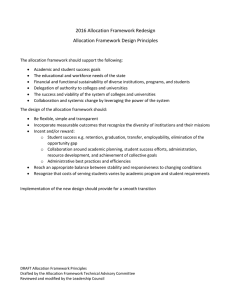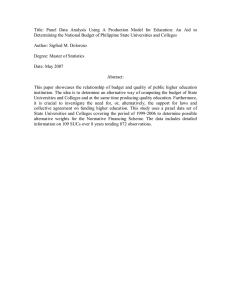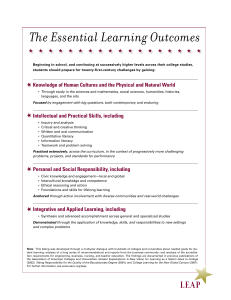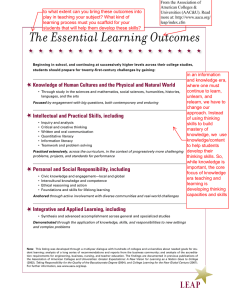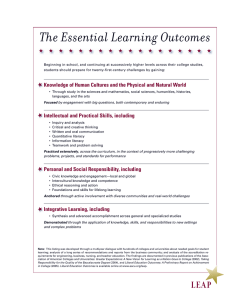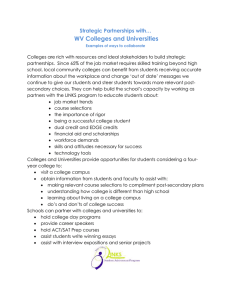Role of higher ed in ec dev.doc
advertisement
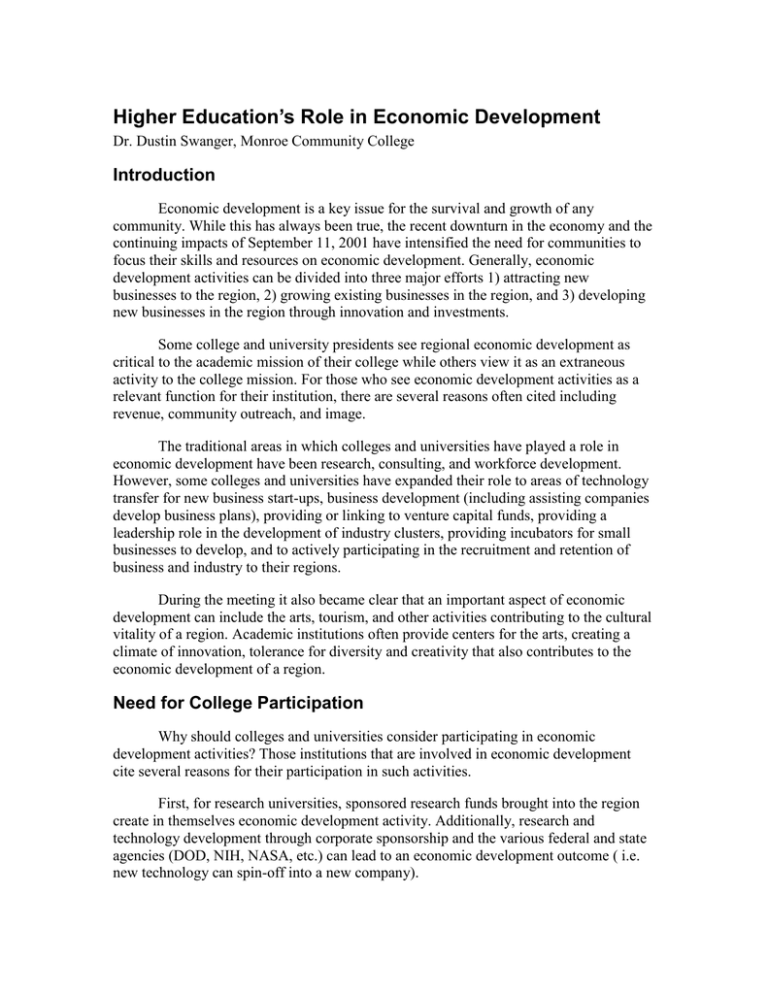
Higher Education’s Role in Economic Development Dr. Dustin Swanger, Monroe Community College Introduction Economic development is a key issue for the survival and growth of any community. While this has always been true, the recent downturn in the economy and the continuing impacts of September 11, 2001 have intensified the need for communities to focus their skills and resources on economic development. Generally, economic development activities can be divided into three major efforts 1) attracting new businesses to the region, 2) growing existing businesses in the region, and 3) developing new businesses in the region through innovation and investments. Some college and university presidents see regional economic development as critical to the academic mission of their college while others view it as an extraneous activity to the college mission. For those who see economic development activities as a relevant function for their institution, there are several reasons often cited including revenue, community outreach, and image. The traditional areas in which colleges and universities have played a role in economic development have been research, consulting, and workforce development. However, some colleges and universities have expanded their role to areas of technology transfer for new business start-ups, business development (including assisting companies develop business plans), providing or linking to venture capital funds, providing a leadership role in the development of industry clusters, providing incubators for small businesses to develop, and to actively participating in the recruitment and retention of business and industry to their regions. During the meeting it also became clear that an important aspect of economic development can include the arts, tourism, and other activities contributing to the cultural vitality of a region. Academic institutions often provide centers for the arts, creating a climate of innovation, tolerance for diversity and creativity that also contributes to the economic development of a region. Need for College Participation Why should colleges and universities consider participating in economic development activities? Those institutions that are involved in economic development cite several reasons for their participation in such activities. First, for research universities, sponsored research funds brought into the region create in themselves economic development activity. Additionally, research and technology development through corporate sponsorship and the various federal and state agencies (DOD, NIH, NASA, etc.) can lead to an economic development outcome ( i.e. new technology can spin-off into a new company). Second, many colleges, as well as research universities, cite academic opportunities for collaboration. Participation in economic development activities including small business start-ups, workforce development, entrepreneurship, etc. can provide faculty the opportunity to gain additional experiences in their field and bring those experiences to the classroom. Such collaborations also offer opportunities for students to conduct research, gain experience, participate in business competitions and other activities. A third reason cited is more altruistic. Many presidents simply state that what is good for the community, is good for the college or university. That overarching theme implies that participation in economic development activities means short and long-term benefits for a higher educational institution. These benefits can include a strong tax base, increased enrollments, positive public image, and others. Higher education participation in economic development activities builds a stronger community. It follows that attracting strong faculty members to the university or college is easier by nature of the strong community; successful individuals are attracted to successful communities. Issues to Address The issues identified for higher education range from leadership to procedural in nature. They all require a leadership buy-in and, in some cases, suggest or imply policy modifications. We will take each issue identified and discuss briefly the concerns. 1. Presidential Leadership An issue mentioned on several occasions regarding the economy and its development is the apparent lack of an articulated vision for the region. Clearly the development of such a vision is an overall community strategy and agenda; however, college and university presidents must take a leadership role in economic development. A meeting of the area presidents provides an excellent forum for college presidents to discuss economic development activities and to decide the leadership role they will take. While recognizing that economic development is “led” by several agencies and governments in any given region, college presidents who have had a presence at that leadership table have had great impact on their communities. In addition, presidents should consider creating a regional committee (permanent or ad hoc) consisting of representatives who would serve as their colleges’ economic development officer. Presidents should identify who on their campus is the person primarily responsible for their college’s economic development activities to serve on such a committee. The committee would provide coordinated input of higher education’s role and contributions into the development of marketing strategies for the recruitment of companies to the region, inventory the assets of the region’s colleges that can be leveraged for economic development activities, share information to help guide regional curricula, and coordinate the resources available to business and industry in the region. 2 2. Policy Modifications Regarding college and university policies and practices, there may be issues around embracing economic development initiatives and the policies and practices of each institution. The issues are as follows: First, few institutions include economic development or any reference to such activities in their mission statements. Mission statements set the priorities and activities of any organization. The lack of any reference to economic development suggests, then, that economic development is not a priority. Those institutions without such a reference should examine their mission and its relation to economic development and determine their role, if any. Will they conduct research? Will they provide engineering services and/or consulting? Is their focus on providing business graduates? What opportunities will students in career and business programs have to participate with companies? Will they support a business incubator for students or small businesses? Such questions of broad mission and policy are the purview of the president and the institution’s board. Second, consideration might be given to broadening the traditional criteria for faculty promotion and tenure to recognize some activities related to economic development as appropriate intellectual or scholarly activity. Few, if any, area colleges or universities now consider economic development activities in their promotion and tenure processes. Could the development of a new technology, and its patent, be considered comparable to a publication and therefore equally worthy for consideration? Could activities to develop the region’s workforce in new high technology areas also be considered as reasonable activities or service toward promotion and/or tenure? Third, some college and university faculty, are now involved in business start-ups based on technologies developed or enhanced in university labs. However, faculty often struggle between leaving the university to start and manage such a new company, and remaining a member of the faculty where they can continue to teach, conduct research, and participate in the academe. Universities should consider policies that make it possible for faculty to participate in a business start-up while maintaining their faculty status and provide clarity about any related intellectual property issues. Such policies may enable the faculty member to remain on the faculty yet serve a new company as the Chief Technical Officer or on a Scientific Advisory Board. The University may become a partner in the company and provide venture capital as an investment. Efforts in this area would allow faculty to be entrepreneurial while enabling universities to retain high quality faculty and perhaps attract additional faculty who would be interested in joining an entrepreneurial community. 3. Inter-Institutional Collaborations in Technology and the Arts Another area for consideration is that of Inter-Institutional Collaborations. There are many areas where, through collaboration, greater outcomes toward economic development efforts will be achieved. A model of university collaboration for research projects comes from Chicago. There, the major research universities get together to discuss areas in which they wish to pursue research funding. They also determine how 3 they can best pursue funding as a consortium in order to be successful. While the Chicago universities also pursue grants on their own, this collaborative effort has increased the research dollars coming to the region. It has increased inter-college communications and projects that leverage the strengths of the various regional institutions as well. Through collaborative efforts, area colleges and universities can pursue the development of technology clusters. With the participation of all of the area colleges, there is more to gain for each college and as a community. In conjunction with the development of industry clusters, area institutions can facilitate the development of Centers of Excellence. In such Centers, collaborative research is done, training is conducted, professional meetings take place, and high technology symposia are presented. Each area institution would bring with it expertise to add to the centers. Beyond the technology and business skills that colleges and universities bring to the economic development table, there is another aspect to economic development which higher education brings to the community: creativity. Insight from a recent book by Richard Florida, “The Rise of the Creative Class”, Florida and researchers from Carnegie Mellon University identified entrepreneurially successful communities as those that are attractive to a “creative class” of individuals. These cities have not only technical expertise, but also an active arts community and a tolerance for diversity and alternative ideas. Activities in this area include the development of the arts and providing an outlet for students to express their art with the community. Embracing an atmosphere of creativity and diversity on campus affects a similar atmosphere in the community. Through collegiate art and theatre competitions open to the community, community education classes, open houses, community art exhibitions on campus, and other activities, the development of an atmosphere of creativity begins to develop. Those communities that have experienced success in these areas (San Francisco and, more recently, Austin, TX) have successfully attracted young creative people to the community, inspired creativity in area companies, and increased the economic impact of hospitality and tourism in their regions. 4. Relations with the Community, Students, and Graduates Another means by which the colleges and universities can help, is in keeping the best and brightest students in the region. Many communities experience what is commonly called the “brain drain”. College and university graduates who are highly successful either return home from their experience in higher education or often move to other parts of the country upon graduation. Efforts can be made to keep those successful individuals in the region. These efforts include colleges and universities collaboratively working with business and industry to develop opportunities locally through internships, co-ops, and placements. One such effort could operate in concert with the local businesses and business organizations, where placement directors for all of our colleges convene regularly to hear from smaller companies about hiring needs. This increased communication helps us to understand company needs better, and it helps companies find out that they too can gain entrée to some of the smartest and best students. 4 Efforts toward developing an atmosphere of creativity also help in keeping recent college graduates in the region. Collaboration with a marketing campaign can assist in presenting an image of the local economy as a place to live and grow. 5. Seed Venture Capital Lastly, and perhaps the most controversial and thus requiring a more detailed exploration, there is an opportunity for colleges and universities to use some funds as venture capital in the development of companies in the region. While it is recognized that fiscal management of any university is the purview of its board, evidence supports that managed venture capital investments are equally as secure as investment in the stock market (a practice common with university endowments). The reason often cited for not investing in seed capital funds locally is the risk involved and the fiduciary duty to the fund being managed. In light of the rates of return demonstrated in all the recent studies of investment performance nationally, colleges and universities should examine this position and give further consideration to investing in seed funding for emergent companies in the region. Recent studies by the Harvard Business Review, the National Venture Capital Association and the Wharton School have demonstrated that such investments, over long periods by the Universities cited above, have, in fact, provided an impressive return on investment. The higher education community has an opportunity to change the economic landscape for its own benefit, the benefit of its local communities, and that of its faculty and students. A vibrant emerging technology market will attract top faculty to the universities and national firms to the area to partake in the emerging opportunities from all our endeavors. Conclusion Historically, higher education has served three major functions in society; educating future leaders, training individuals for a profession, and preparing individuals to participate in the society. Later, higher education also took on the role of the creation of new knowledge through research and the dissemination of knowledge through scholarly publication. Thus, through these traditional functions, higher education has served an economic development mission; but now the academic community is being challenged to play a more direct role in a knowledge-based economy. While many colleges have, in fact, embraced the economic development aspects of higher education, there are some for which their participation is unclear. New policies and practices are now needed to support the economic development mission of area colleges and those faculty who participate in these activities. Higher education can and does have a tremendous impact on the economic foundation and development of a community. Additionally, in those communities rich with higher educational resources, when those institutions developed collaborations for 5 economic development, success followed. Such a collaborative effort can be done with the leadership of the area presidents. The time and the opportunity are now. 6
